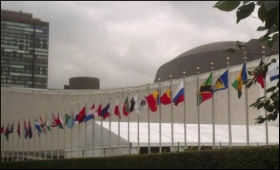|
|
|

|
UN body recommends to mitigate negative consequence of corruption, Covid-19
|
|

|
|
| Top Stories |
 |
|
|
|
SME Times News Bureau | 30 Oct, 2021
With an aim to prevent and combat corruption and recover better despite
the unprecedented shocks of Covid-19, the United Nations Office on Drug
Control and Crime has published a policy paper to mitigate the negative
consequences of corruption and
Covid-19.
According to the
policy paper published on Thursday, it has suggested measures taken by
member states to prevent and combat corruption and recover better
despite the unprecedented shocks of Covid-19.
It is critical for
member states to make choices on how to recover better for the future
and foster resilience in preparation for future crises.
"Member
states have already taken significant steps to integrate and enforce
anti-corruption measures across response and recovery plans by engaging
all sectors and sections of society.
Sharing these illustrative
actions could help support the development, strengthening and
enforcement of similar measures by member states, thereby reducing the
risks of corruption and increasing the impact of the global response and
recovery," the policy paper said.
The UN body has suggested all
emergency funds received would be subject to an audit within six months
and a publication of findings, including the full text and beneficial
ownership information for all procurement contracts.
The specific
budget lines could be created to help track and report emergency fund
expenditures on a regular basis through a transparent online portal
along with rapid processing of whistle-blowing reports related to
violations in the implementation of Covid-19 legislation.
It also
recommended that the supreme audit institution or similar body could
create a Covid-19 health emergency control strategy and use existing
knowledge to verify the acquisition and distribution of essential
products to vulnerable populations.
The international body
pleaded that all grants disbursed from a central fund or related to
short-term employment assistance could be required to undergo a
retrospective audit to confirm the accuracy of the data submitted by
grant beneficiaries.
Suggesting that the Parliament of the member
countries could require information from the Ministry of Health or
related institution concerning the allocation and distribution of public
resources to fight Covid-19, including with respect to the procurement
of essential goods and medical equipment, the UN body suggested that a
Parliamentary committee could be established to monitor and supervise
the implementation of emergency measures through updated information
from all relevant authorities, including the Anti-Corruption Commission
for monitoring purposes.
Talking about the public procurement of
emergency medical supplies and services and pre-registering suppliers,
the UN body said institutions could be empowered to quickly check
suppliers and procure what they need without concerns about
price-gouging or falsified products after the centralized procurement
authority sets conditions for procurement and verified suppliers who
registered in a publicly available framework agreement.
A help
desk by the central purchasing body could be established to enable
contracting authorities to consult on emergency procurement procedures,
complemented by guidelines, templates for authorizing direct awards if
necessary and regularly updated lists of available products and
pre-screened suppliers, it added.
The re-sale of masks and other
medical equipment and supplies could be prohibited to mitigate
incentives for individuals and groups to purchase such goods and sell
them at a higher price.
All information concerning crisis-related
public procurement and the beneficial owners of companies on contract
with the government to respond to Covid-19 should be made publicly
available.
Suggesting to fix a maximum price limit, an emergency
procurement instruction from the government could detail maximum prices
for emergency medical supplies such as personal protective equipment and
the government could issue a policy note that encourages contracting
authorities to quickly pay suppliers to maintain businesses while also
calling on them to make any data, including balance sheets, ledgers and
profit and loss accounts, available to contracting authorities to ensure
that funds were used as intended.
Proposing for open
contracting, the United Nations body said Covid-19 related procurement
could be excluded from typical procedures, but all contracts would be
required to be reported and published in full within one day of signing.
Civil
society organizations would thus be able to track the procurement of
essential supplies, checking the price of coronavirus tests to ensure
that authorities are spending resources efficiently, it added.
The
UN body strongly suggests to use technology and open data to prevent
corruption in Covid-19 response and recovery digital platforms to reduce
corruption risks while increasing transparency and the corruption risk
mapping project operated by the government could engage anti-corruption
institutions and local communities to monitor, track and update
information concerning potential corruption across the country to ensure
the state is aware and can respond appropriately.
Proposing a
digital accountability platform, the UN policy paper suggested setting
up an accountability platform could provide the general public and state
control agencies with data on the management of funds by various state
agencies, including general and specific overviews of the disbursement
of subsidies, goods and services, and contracting.
|
|
|
| |
|
|
|
|
|
|
|
|
|
|
|
|
|
|
| |
| Customs Exchange Rates |
| Currency |
Import |
Export |
US Dollar
|
84.35
|
82.60 |
UK Pound
|
106.35
|
102.90 |
Euro
|
92.50
|
89.35 |
| Japanese
Yen |
55.05 |
53.40 |
| As on 12 Oct, 2024 |
|
|
| Daily Poll |
 |
 |
| Do you think Indian businesses will be negatively affected by Trump's America First Policy? |
|
|
|
|
|
| Commented Stories |
 |
|
|
|
|
|
| |
|